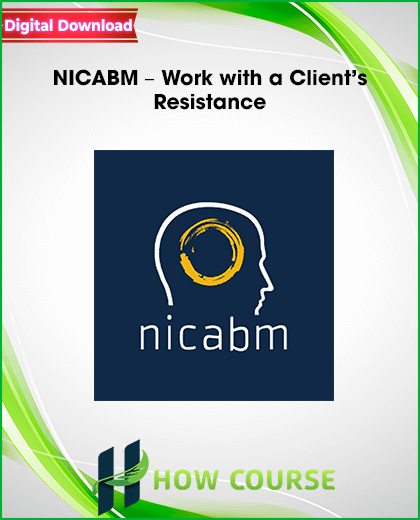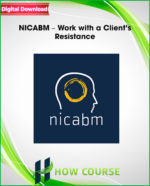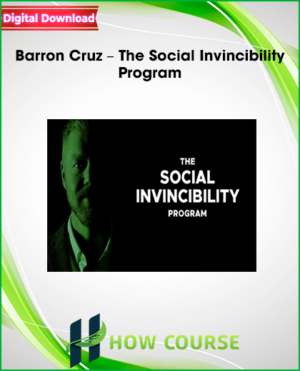NICABM – Work with a Client’s Resistance
Expert Strategies for Dissolving Your Client’s Resistance
When our clients are distrustful or skeptical of our work, it can create difficult barriers to healing.
To us, this can sometimes feel like resistance.
But is resistance even a valid notion?
What may at first seem like opposition, can often signal our client’s deepest struggles.
The difficult part is seeing beyond the “push back” to take in the important message our client is telling us, so we can work with instead of against their energy.
So we asked the top 20 experts in our field how they worked with their most challenging clients. We were surprised by the deep dive of their answers.
They gave us useful skills that can radically shift this kind of resistance and actually help reverse a client’s ambivalence to change.
That’s why we made. . .
How to Work with a Client’s Resistance
How to Help Clients Shift Out of Avoidance so They Can Heal
Part 1: How to Work with Reluctance Linked to Attachment Issues
Pat Ogden, PhD Kelly McGonigal, PhD
How a client’s movement vocabulary can reveal an inner conflict
One way to help clients reestablish a sense of identity in their body
How to approach implicit memories that fuel a client’s avoidance
Part 2: How to Resolve the Core Threat That’s Fostering Your Client’s Opposition
Sue Johnson, EdD Kelly McGonigal, PhD
How to change a combative session into a collaborative one
How to isolate the main threat that’s feeding a client’s rigidity
The simple but powerful way validation impacts an avoidant mindset
One Hidden Fear That May Be Driving Your Client’s Reluctance
Laurel Parnell, PhD Rick Hanson, PhD
The counterintuitive reason your client may be avoiding change
The unique way guilt affects a client’s feelings of unwillingness
How to Help Clients Move Out of a Defensive State
Bessel van der Kolk, MD Stephen Porges, PhD Ron Siegel, PsyD
The critical reason some clients fear calmness
One physiological change that can alter how we interact with others
The specific breathing pattern that can trap a client in a defensive state
3 Skills to Expand a Client’s Openness to Change
Kelly McGonigal, PhD Bill O’Hanlon, LMFT Ron Siegel, PsyD
One personality type that is most prone to challenging the therapy
A 3-step action plan to foster change without triggering opposition
How to promote a healthier mindset that resists barriers to growth
How to Work with the Deep Vulnerabilities That Keep a Client from Change
Richard Schwartz, PhD Kelly McGonigal, PhD Bill O’Hanlon, LMFT
Terry Real, MSW, LICSW Ron Siegel, PsyD
The crucial message that can soften a client’s protective parts
The specific way to introduce hope in the healing process (so it’s actually received)
How to work with “rational deformity” to help clients build authentic connections
The silent vulnerability that’s most often behind a client’s reluctance
How to Avoid Misdiagnosing Clients as Unmotivated
Michael Yapko, PhD Bill O’Hanlon, LMFT Ron Siegel, PsyD
The key factor that falsely presents as a lack of motivation
The vital message your client is giving you when they don’t follow your advice
The important difference between resistance and rigidity
How a client’s specific cognitive style can keep them stuck in avoidance
How to Sell Behavior Change to Your Most Challenging Clients
Marsha Linehan, PhD Peter Levine, PhD
What can go wrong when you engage a client’s willfulness
How to help clients be more open to your interventions
What a client needs to get from you before they’ll agree to your ideas
How to Help Clients Shift from Reluctance to Openness
Shelly Harrell, PhD Ron Siegel, PsyD Kelly McGonigal, PhD
How to identify seeds of unwillingness inside the therapeutic alliance
One change that can improve your outcome with clients who oppose all your ideas
How to work with clients who struggle to disclose feelings
3 therapeutic messages to help clients reverse their reluctance
How the Practitioner May Be Perpetuating Opposition in Their Client
Rick Hanson, PhD Bill O’Hanlon, LMFT Zindel Segal, PhD
Ron Siegel, PsyD Kelly McGonigal, PhD Joan Borysenko, PhD
What can go wrong when you resist a client’s resistance
How to recognize the dangerous way a client’s willfulness may be affecting you
How to foster a high level of support for clients who don’t do the work
Stephen Porges, PhD
Developer of Polyvagal Theory; Distinguished University Scientist at the Kinsey Institute at Indiana University Bloomington and Research Professor in the Department of Psychiatry at University of North Carolina Chapel Hill
Marsha Linehan, PhD
Creator of Dialectical Behavior Therapy (DBT); Professor of Psychology, Adjunct Professor of Psychiatry and Behavioral Sciences at the University of Washington and Director of the Behavioral Research and Therapy Clinics
Peter Levine, PhD
Founder of Somatic Experiencing; Author of Trauma and Memory: Brain and Body in a Search for the Living Past: A Practical Guide for Understanding and Working with Traumatic Memory
Pat Ogden, PhD
Pioneer in Somatic Psychology; Founder and Director of Sensorimotor Psychotherapy Institute (SPI); Co-founder of the Hakomi Institute; Author of Sensorimotor Psychotherapy: Interventions for Trauma and Attachment
Richard Schwartz, PhD
Founder of Internal Family Systems (IFS) and The Center for Self Leadership
Bessel van der Kolk, MD
Neuroscientist and Professor of Psychiatry at Boston University Medical School. Author of The Body Keeps the Score: Brain, Mind, and Body in the Healing of TraumaSue Johnson, EdD
Creator of Emotionally Focused Therapy (EFT); Founder and Director of the International Centre for Excellence in Emotionally Focused Therapy
Shelly Harrell, PhD
Licensed Psychologist specializing in multicultural and community psychology; A Professor with the Pepperdine Graduate School of Education and Psychology
Dan Siegel, MD
Executive Director of the Mindsight Institute; Co-Director of UCLA’s Mindful Awareness Research Center; author of Mindsight: The New Science of Personal Transformation and The Mindful Therapist: A Clinician’s Guide to Mindsight and Neural Integration
Rick Hanson, PhD
Senior Fellow of the Greater Good Science Center at UC Berkeley; New York Times bestselling author of Hardwiring Happiness and Buddha’s Brain
Steven Hayes, PhD
Creator of Acceptance and Commitment Therapy (ACT); Nevada Foundation Professor at the Department of Psychology at the University of Nevada, Reno
Ron Siegel, PsyD
Assistant Clinical Professor of Psychology, part time, Harvard Medical School; Author of The Mindfulness Solution: Everyday Practices for Everyday Problems and Sitting Together: Essential Skills for Mindfulness-Based Psychotherapy
Zindel Segal, PhD
A founder of Mindfulness-Based Cognitive Therapy (MBCT); Professor of Psychology at the University of Toronto
Laurel Parnell, PhD
Leading expert in Eye-Movement Desensitization and Reprocessing (EMDR); Author of Attachment-Focused EMDR: Healing Relational Trauma
Kelly McGonigal, PhD
Health psychologist and lecturer at Stanford University; Author of The Upside of Stress: Why Stress Is Good for You and How to Get Good At It and The Willpower Instinct: How Self-Control Works, Why It Matters, and What You Can Do to Get More of It
Joan Borysenko, PhD
Founder of Mind/Body Health Sciences LLC; Author of New York Times Bestseller Minding the Body, Mending the Mind
Bill O’Hanlon, LMFT
Co-developer of Solution-Oriented Therapy; Psychotherapist, speaker, and author of Do One Thing Different: Ten Simple Ways to Change Your Life
Stan Tatkin, PsyD, MFT
Founder of the PACT Training Institute and developer of a Psychobiological Approach to Couple Therapy (PACT)
Michael Yapko, PhD
Leading expert in clinical hypnosis and treating depression; Clinical psychologist and author of 15 books including his newest books, The Discriminating Therapist and Keys to Unlocking Depression
Terry Real, MSW, LICSW
Founder of the Relational Life Institute; author of I Don’t Want to Talk About It: Overcoming the Secret Legacy of Male Depression and The New Rules of Marriage: What You Need to Make Love Work
Course Director
Ruth Buczynski, PhD
Dr. Ruth Buczynski is a licensed psychologist and founder and president of The National Institute for the Clinical Application of Behavioral Medicine (NICABM). NICABM helps physicians, nurses, psychologists, social workers, and counselors – practitioners who have some of the most significant and life-changing missions on the planet – provide cutting-edge, research-based treatment strategies to their patients. For more than 25 years, NICABM has offered accredited training and professional development programs to thousands of practitioners worldwide.
Here’s What You’ll Get:
Everything is yours to keep forever in your professional library
Downloadable videos so you can watch at your convenience, on any device
Audio recordings you can download and listen to at home, in the car, at the gym or wherever you like
Professionally-formatted transcripts of the sessions, to make review and action simple
Five downloadable bonus videos to help you work more effectively with a client’s resistance
Get 5 Bonuses That Give You Even More Strategies for Working with a Client’s resistance
The Brain Science Behind a Client’s Unwillingness (and How It Can Foster More Powerful Interventions)
Dan Siegel, MD Kelly McGonigal, PhD
Joan Borysenko, PhD
How “spiritual bypass” can keep clients stuck in avoidance (and how to work with it)
Why underdevelopment of this part of the brain can lead to reluctance
How to Work with Avoidant Relationships
Stan Tatkin, PsyD, MFT
Why it’s vital for you to introduce pain and discomfort in your work with certain couples
How to help couples confront the vital issues they’ve learned to avoid
The Key Message Inside Your Client’s Unwillingness
Steven Hayes, PhD Bill O’Hanlon, LMFT
Kelly McGonigal, PhD Ron Siegel, PsyD
Why you should always walk toward your client’s resistance
One professional risk that can strengthen the therapeutic relationship and foster change
One Change That Can Unravel a Client’s Rigid Beliefs
Kelly McGonigal, PhD Ron Siegel, PsyD
Bill O’Hanlon, LMFT
The clarifying reason we need pushback from our clients
Why you need to feel uncomfortable in your session (this can make all the difference)
What lies beneath most clients’ rigid beliefs
How to Engage with a Willful Client
Marsha Linehan, PhD Ron Siegel, PsyD
Kelly McGonigal, PhD
The parenting model that can improve your work with willful clients
The trick to working with willfulness (it may go against your natural inclination)
The danger of using contingency management to foster behavior change
> Please contact our team if you have questions, or broken links via our email [email protected]








